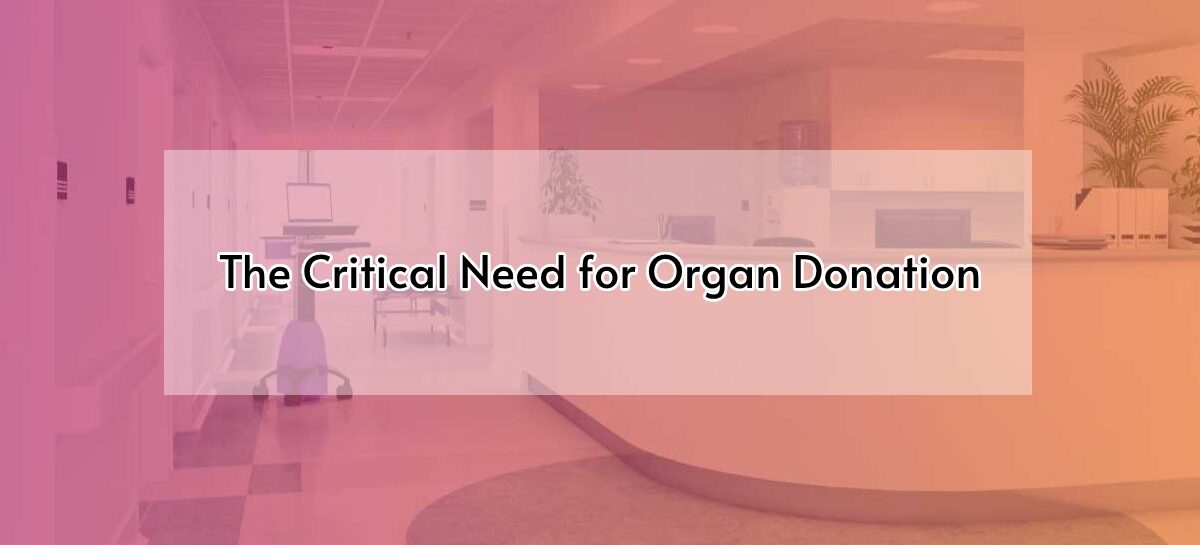“……off all the things it is possible to donate, to donate your own body is infinitely more worthwhile……” – Manusmriti
Introduction
Organ donation is a selfless act that can save lives, provide hope, and leave a lasting legacy. By donating organs, tissues, and even bone marrow, individuals have the power to transform tragedy into hope and contribute to the well-being of others. This write-up aims to shed light on the importance of organ donation, its benefits, and the steps individuals can take to become donors.
Every year, countless lives are lost due to organ failure. Organ transplantation offers a second chance at life for those suffering from various illnesses such as heart disease, kidney failure, liver failure, and more. Organ donation stands as a remarkable solution that can bridge the gap between life and death for many individuals in need. The demand for organs far exceeds the supply, underscoring the urgency of increasing organ donations.
While India performs the third highest count of transplants globally, the demand for organs far surpasses the current transplant rate. The national organ donation rate in India, originating from brain death cases, stands at a discouragingly low rate of 0.8 per million population. Alarmingly, a new individual joins the waiting list for transplantation every 10 minutes within the country.
Types of Organ Donation
There are two main types of organ donation:
Deceased Donation – Organs are retrieved from individuals who have passed away but are medically suitable for donation – Brain dead patient (DBD), Cardiac arrest patient(DCD). This type of donation can save multiple lives as different organs can be transplanted to different recipients
Living Donation – Living individuals can donate certain organs like kidneys, portions of the liver, and bone marrow. The body can often regenerate these organs, allowing the donor to live a healthy life post-donation.
Challenges of Organ Transplantation
- Inadequate Awareness: Insufficient understanding among the public regarding the significance of organ donation and transplantation results in a scarcity of available organs.
- Donor Shortfall: Despite heightened awareness efforts, a deficit in organ donors persists, influenced by factors such as religious beliefs and distrust in the healthcare system.
- Ethical and Legal Concerns: Numerous ethical and legal dilemmas surround organ donation, encompassing consent, equitable organ allocation, and just distribution of donated organs.
- Transport and Preservation Challenges: Ensuring the viability of organs for transplantation necessitates precise transportation and preservation conditions, presenting logistical hurdles, especially for organs with limited durability. Recently, machine systems have emerged to extend the viability of perishable donated organs.
- Medical Suitability: Not all donated organs are suitable for transplantation due to medical reasons or other factors, thus constraining the pool of available organs for transplant procedures.
- Financial Implications: The expenses tied to organ transplantation can be substantial, potentially restricting treatment access for certain patients.
How to Become an Organ Donor
- Register in official organ donor registries. Individuals can indicate their intent to donate their organs after their passing.
- Inform Your Family. Communicate your decision with your family so they can honor your wishes.
- Consider Living Donation- For those interested in living donation, research and consultation with medical professionals are necessary to determine suitability.
Myths and Misconceptions
- Religious Beliefs – Many major religions support or have no objections to organ donation. It’s important to clarify misconceptions with religious leaders if needed.
- Medical Treatment – Being an organ donor does not affect the quality of medical treatment received by healthcare professionals.
- Age and Health -People of all ages and health statuses can potentially be organ donors. Medical professionals determine the suitability of organs upon donation.
Liver Transplant scenario in India
In India every year nearly 200,000 die of liver diseases. Total number of liver transplant done in 2022 is 3431 living 834 cadaver and 2957 living donor liver transplant. LDTX occupy for major percent liver transplant happening in India. Organ donation rate in India has increased <0.05 per million populations to 0.8 per million population now organ donation rates in India minuscule compare to Croatia 36.5, Spain 35.3, USA 26 per million respectively. In a year 40000 people require liver transplant because of shortage of organ pool many patient died during the waiting period In India Tamilnadu which is the best performing in state in entire country rate is 1.8 donation per million.
Tamilnadu’s transplant program is mainly driven by team of transplant doctors and coordinators rather than the professionals involved in patient’s primary care-most of them if not all, are not trained or even primed to think about donation.
Intensifying the awareness among medical professionals themselves is the key and expanding the transplant faculty and infrastructure facilities are need of the hour. National medical commission and universities should endeavour to include the social aspect of organ donation in the curriculum of doctors and paramedics. Recently Tamilnadu has enrolled many district level hospitals as organ donation centres which is a welcome shift that has vastly increased the donor pool in the first half of 2023.
Liver transplant Programme in Kauvery hospitals
In Kauvery hospital we offer both Deceased donor liver transplant (DDLT) and Living donor liver transplant (LDLT). We are one of the very few centres in India which offer Living donor liver transplant by Minimally Invasive surgery(MIS) – by Robotic and Laparoscopy. The advantages of MIS for donor is safety, precision, less scar, less pain and faster recovery.`
Waiting time for getting liver transplant are shorter for patients in Kauvery Hospitals as we offer both DDLT and LDLT across all zones in Tamilnadu – Chennai, Trichy Salem, Hosur.
Conclusion
Organ donation is an extraordinary gift that has the potential to transform lives, families, and communities. By understanding the critical need for organ donation, dispelling myths, and taking concrete steps to become a donor, individuals can leave a lasting impact that transcends their own lives. Through this act of compassion, we can turn the tragedy of loss into the hope of renewed life.
You will live on even after you are gone. So take a simple step, pledge to donate your organs. A second chance is in your hands and save a life afterlife. Let someone thank you.
Quotes
“The measure of life is not its duration but its donation.” – Peter Marshall
 Dr Swaminathan Sambandam
Dr Swaminathan Sambandam
Senior Consultant & Lead, Multi-Organ Transplant (Liver, Kidney, Pancreas & Small Intestine)
Kauvery Hospital Chennai



